1.
For Southern California natives, it’s no secret that there are culinary gems outside of Los Angeles. There is an “Empire” past the margins of Los Angeles county, that on most maps appears to be either a desert, a mountain range, or one long freeway. As a native myself, I can attest that this sprawling land mass is indeed an amalgamation of these topographical features. This region, spanning some twenty seven thousand square miles, houses a collection of eccentric cities and towns that pass under the cultural radar. While towns with names like Riverside, Ontario, San Bernardino, Rancho Cucamonga, and Redlands are often overlooked in comparison to the bustling metropolis further west or south. But within this collection of cities, known affectionately as the “Inland Empire,” there has been a push to create a unique culinary culture based on craft, expertise, and the pooling of local resources. As a result, something resembling a micro-community has sprouted up in a region afflicted with economic instability.
A cultural shift, or zeitgeist, always starts with some tipping point. For this story, that defining moments is the opening of The Salted Pig in Downtown Riverside. For some, being the Inland Empire’s first new American gastropub might not be an important title. But for Riverside native Ronaldo Fierro, owner of Fierro Foods, parent company to The Salted Pig and W. Wolfskill, this title comes as an honor. This, however, was not the end of his journey as a proprietor. As a region known for biker gangs and housing crises, creating and fostering a culinary culture is an uphill battle. Renaldo Fierro believes that Riverside, the Inland Empire, deserves a world class dining experience, regardless of its location and surrounding. This is what drives him as a proprietor. For him, the success and growth of a business, is dependent on the minutiae made up of a supportive team, small details, and warm hospitality.
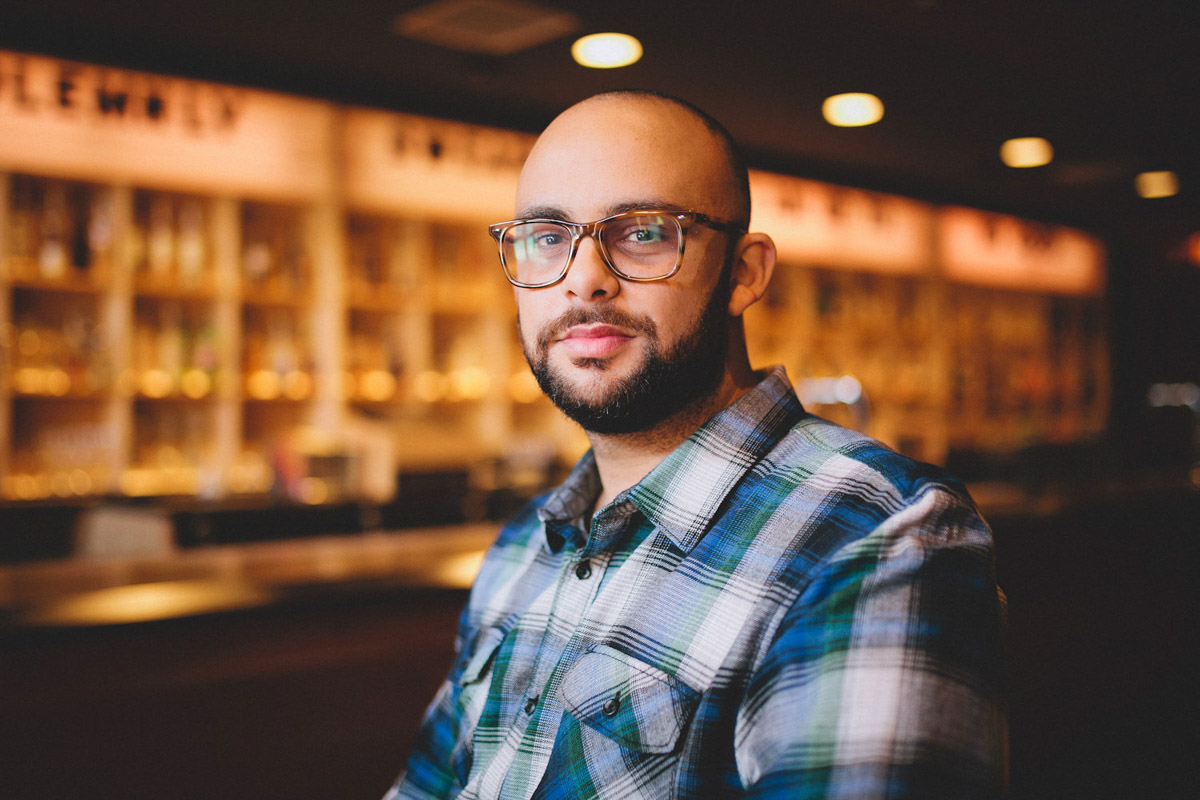
2.
Here is California State Route 91, colloquially known as “the 91.” This is a main artery for the city of Riverside, which houses some three hundred thousand residents, the vast majority of them commuters. There is congestion at 9:45 in the morning at 14th Street, eastbound. This freeway, perpetual in its deconstructed state, has been widened year after year, seemingly inch by inch.
The historic Riverside Courthouse sits at the end of Main Street. The front masthead is flanked with six off-white pillars, a long concrete walkway and two small flights of steps. Spreading out further from here is the Family Law Courthouse and the Hall of Justice. A collection of law offices flank Main Street, and there between the law offices of Christopher J. Buechler, and Earl Carter and Associates is the Office of W. Wolfskill.
If you ask anyone from the Inland Empire to tell you a joke, they might offer you this one: there’s construction going on in Riverside. Here is the punchline, construction never ends. I circle the block where Main Street and 12th intersect a few times. As I round the block a second, various orange cones appear. A space opens up in front of The Salted Pig. A necessary ritual before an interview, or most things that require human interaction, is coffee. Around the corner from W. Wolfskill, and located next door to the brooding, dark mahogany entrance way to The Salted Pig is a glass-front coffee shop. At the end of the line are two young men. Unlike the rest of the somber crowd in line, these men are laughing at each other.
Meet Lonny Huff and Bryan Bruce, two integral parts of Fierro Foods. Lonny is an Operations Administrator. His duties include city liaison, designer, creative development—or “making shit work,” as he puts it. Bryan, on other hand, is the Head Bartender at W. Wolfskill. Much of what is served comes from Bryan’s own compendium of craft cocktails. We order our coffee, and then walk down the block to W. Wolfskill.
We enter Wolfskill through the backdoor. The long corridor grows as the lights are flipped on. Lonny shows me the built-in photo booth and vintage record player.
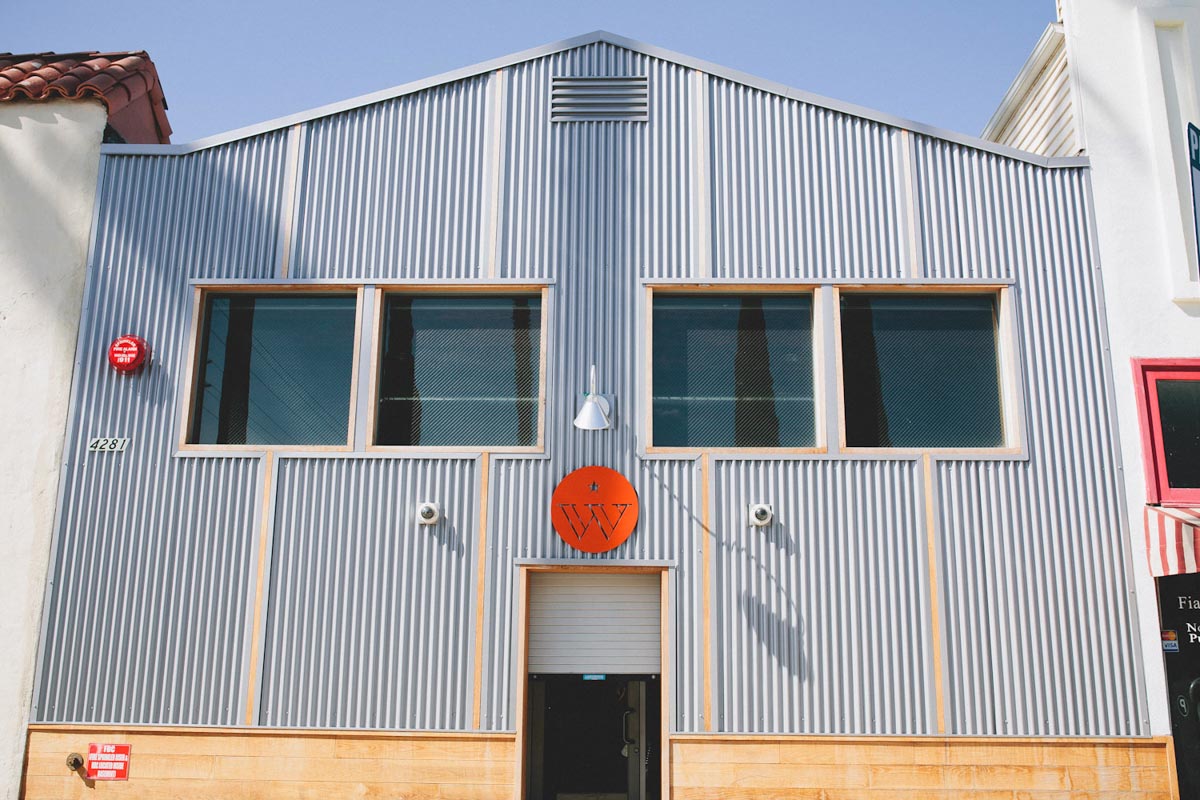

“This is my office,” he says of a comfortable arm chair next to the record player. Bryan sets off to make cocktails for the photoshoot.
“Is it too early for you to drink?” he asks me. “Because I’m making these and someone has to drink them.”
I feel a slight pang of guilt, knowing the effort he will put into making a single drink. He starts to measure things out, and it is nothing short of bar wizardry. But then again, it is roughly 10:30 in the morning. This is the sense I get though, I am their guest and they want me to enjoy myself.
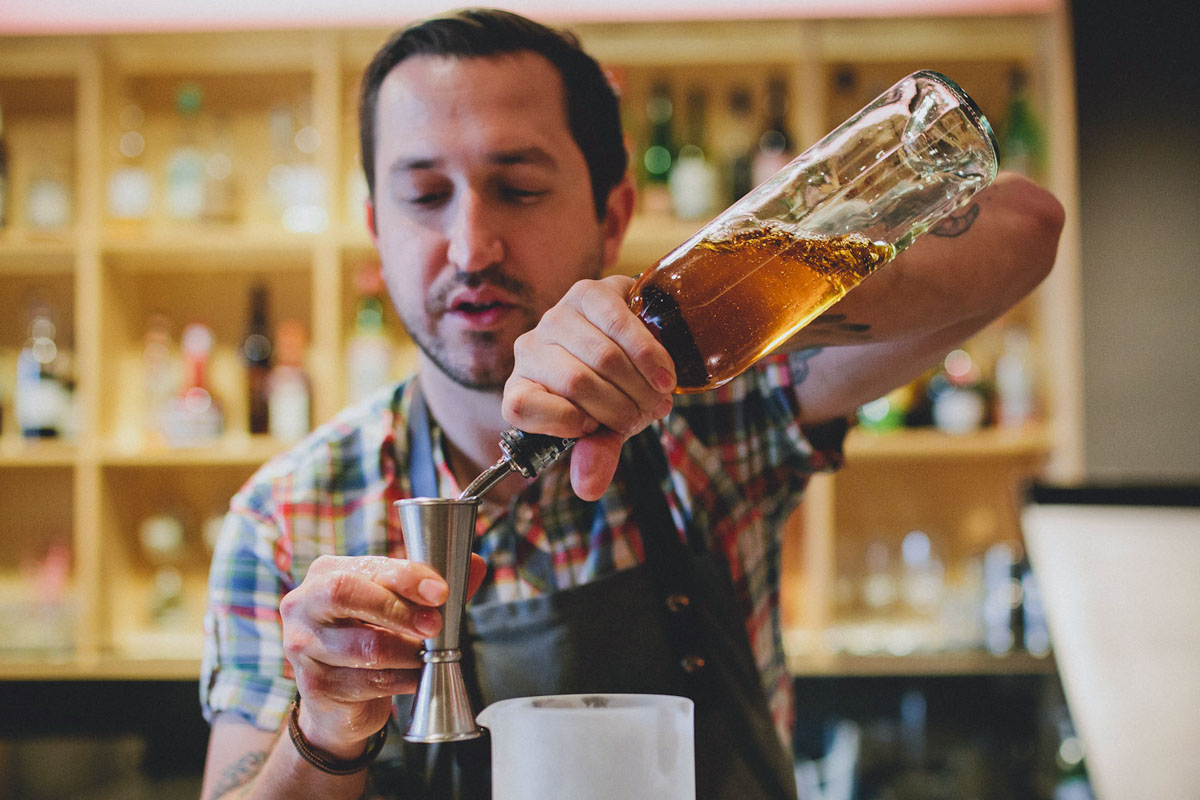
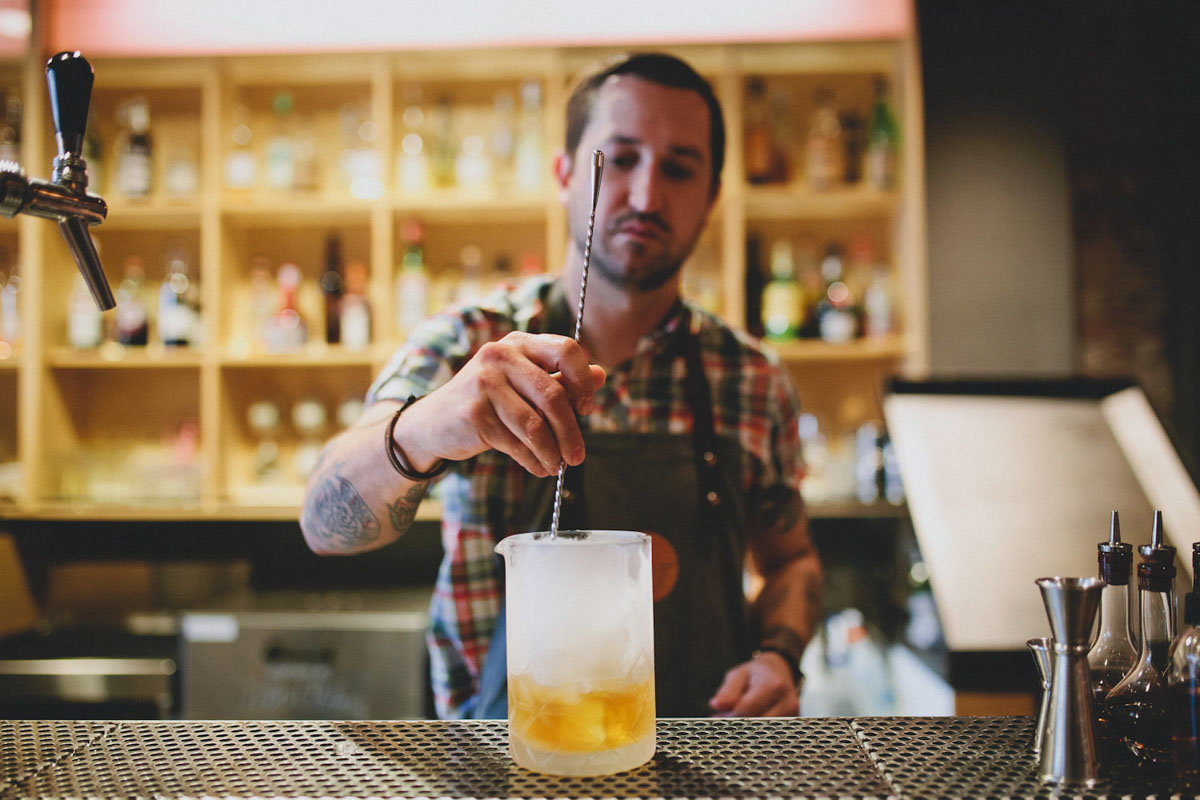
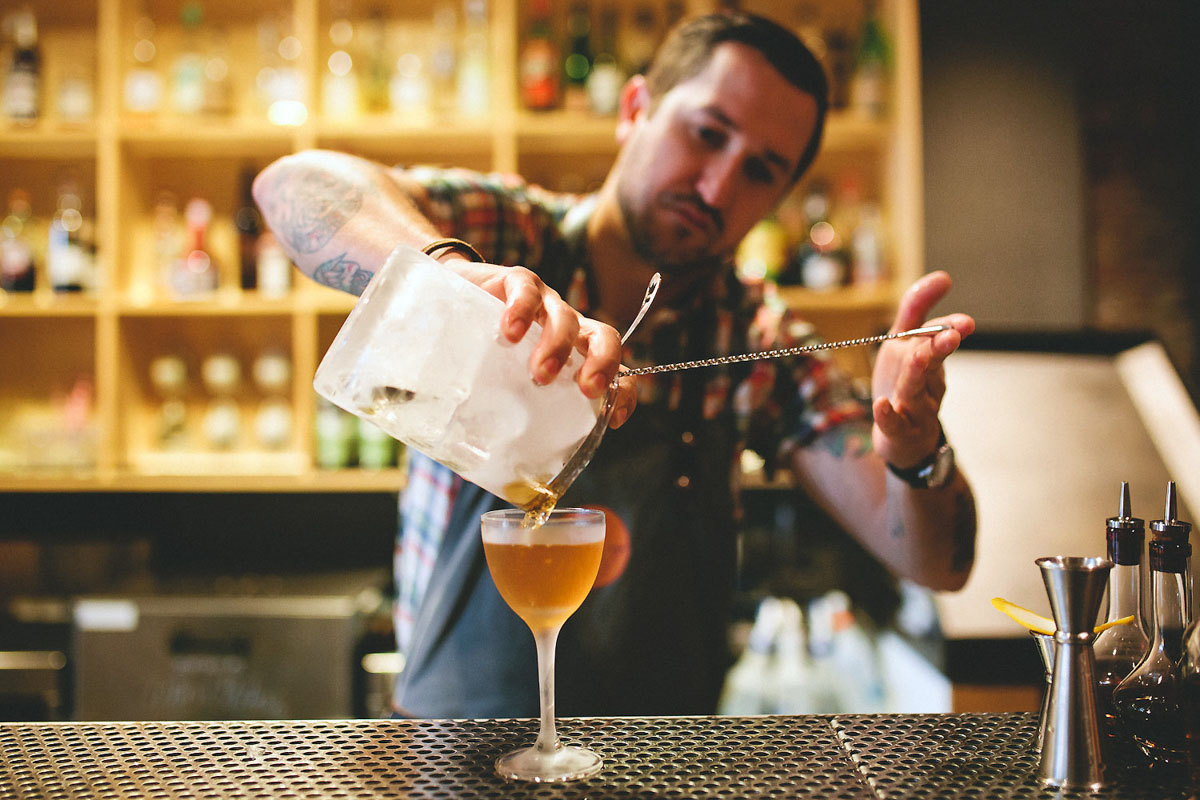
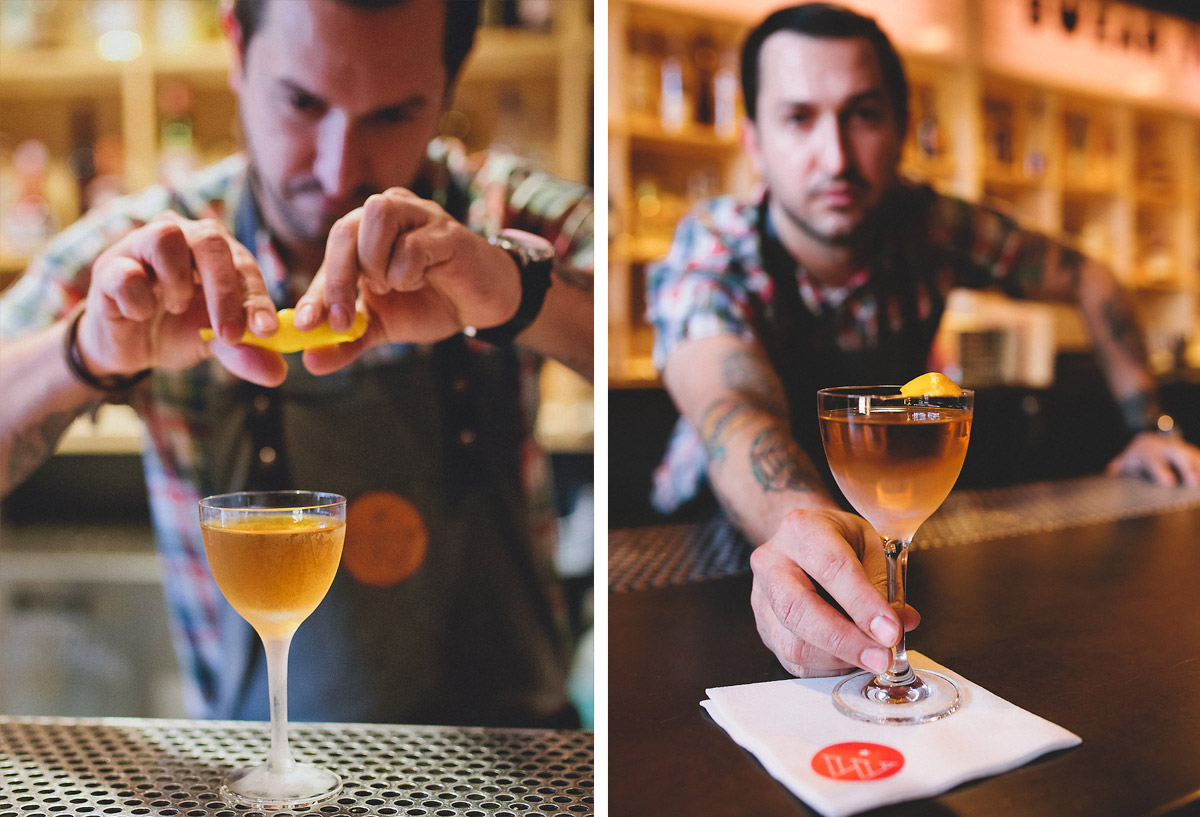
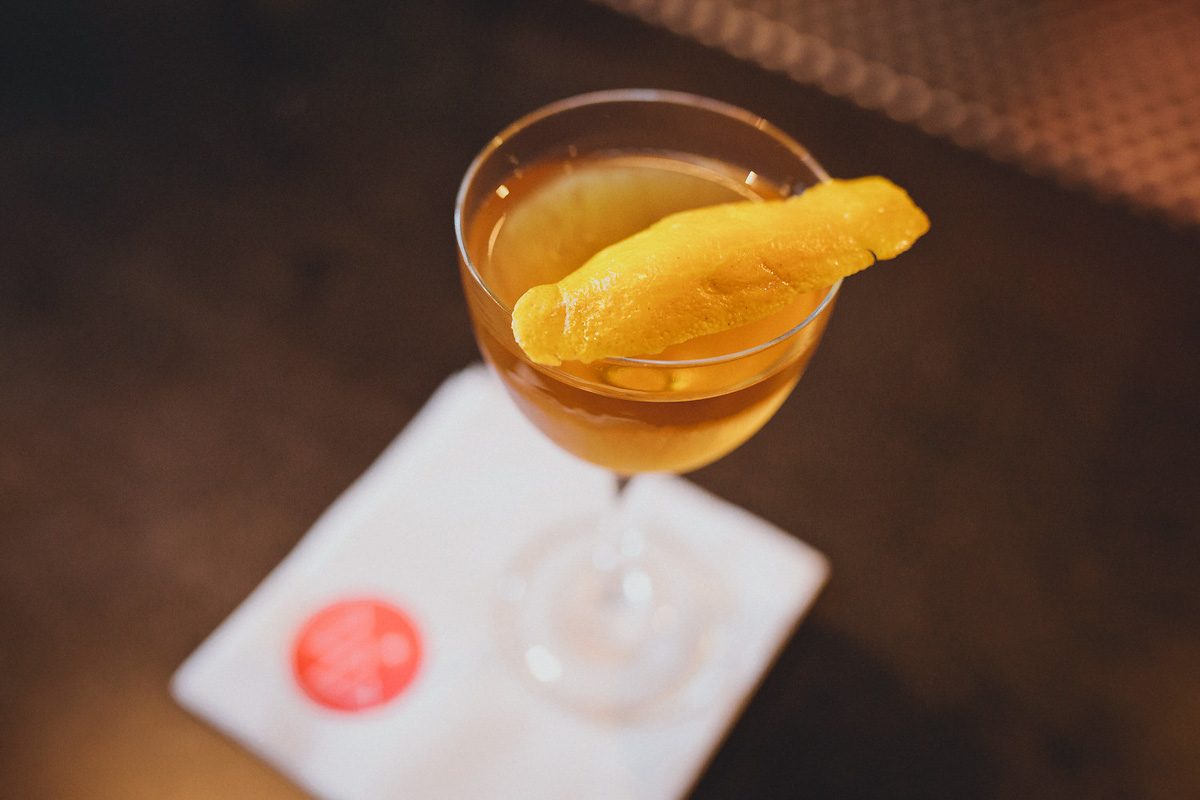
Shortly after we get into the main seating area, Larry Thai enters the bar. Larry is the executive chef for both The Salted Pig and W. Wolfskill. Larry is extremely tall, and has an air of stoicism about him. We shake hands.
“Have you seen the kitchen yet?” Larry asks. I have not.
“No,” I say.
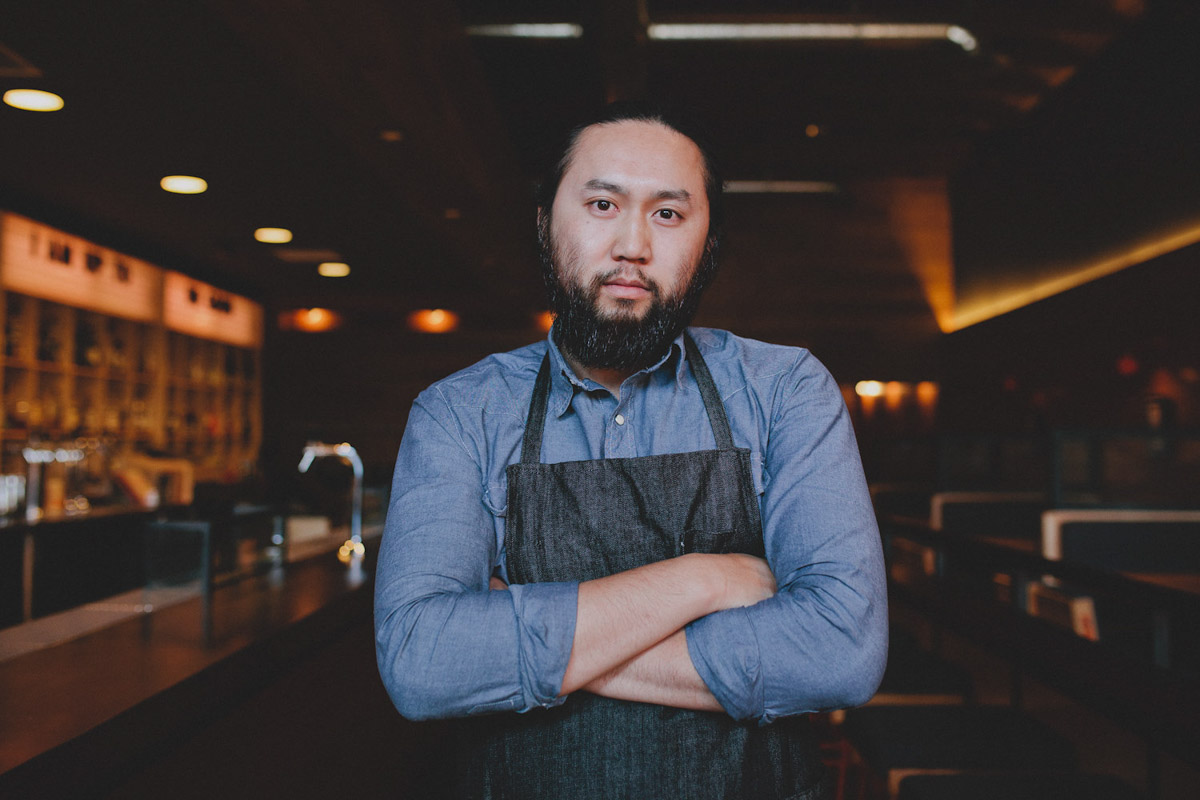
Larry walks into the kitchen, he is pensive. His eyes dart around, taking inventory, making mental notes. He touches one of the tables with his single index finger. This is his element. He is a young executive chef, but he has come into his own over the past three years. There are talks of making him a partner, something he had not expected when he first stepped away from a traditional academic career to go to culinary school. I remember a quote he told me, in the same line at the coffee shop when I met them a few weeks earlier. When asked about the long hours, running the kitchen at two businesses, he looked at me calmly and said, “I would rather come home after a long day and be tired in my bones from doing what I love, then to stare at a computer screen all day and be tired in my head.”
Love seems to be a constant narrative amongst the staff: doing what you love, doing what you do because of love, and loving the small, overlooked details.
Lonny finds me at the bar, where I have been admiring the wall of high-end spirits.
“These are from this past weekend,” he says and hands me two menus. The Valentine’s Day menu for W. Wolfskill says “VDAY, Come Celebrate or Be Miserable.” This tongue-in-cheek slogan contrasts the minimal branding on The Salted Pig’s fourth anniversary menu. I remember that no one in this team is over thirty. They are young, they can get away with it.
As I look it over over the menu, someone turns music on. The music sounds like the Temptations or the Four Tops, something from early Motown. The music, the clean interior lines, the cool charcoal grays and orange accents, the record player, the wall of cocktail glasses and the single tiki mug; these all point to American classics. There is something home-y about the interior of W. Wolfskill, this collection of familiarities.
Ronaldo slips in through the front door. Here is the owner, the proprietor of the business. He greets us all. Immediately, he asks if I’m comfortable or if I need anything. I still have my coffee though. As I come to find out during our interview, this gesture of hospitality is part of Ronaldo’s creed as a restaurateur.
3.
Ronaldo and I sit in the corner table by the entrance. At the far end of the bar, Bryan is working on a new cocktail recipe. He asks Lonny what he thinks about two different cocktail glasses. In front of me, I have the two special menus for that were done for Valentine’s Day at W. Wolfskill, and the fourth anniversary party at The Salted Pig.
“Sheena helped design those,” Ronaldo says
Sheena is Ronaldo’s wife and, as I come to find out, much of the driving force behind the Fierro Foods aesthetic.
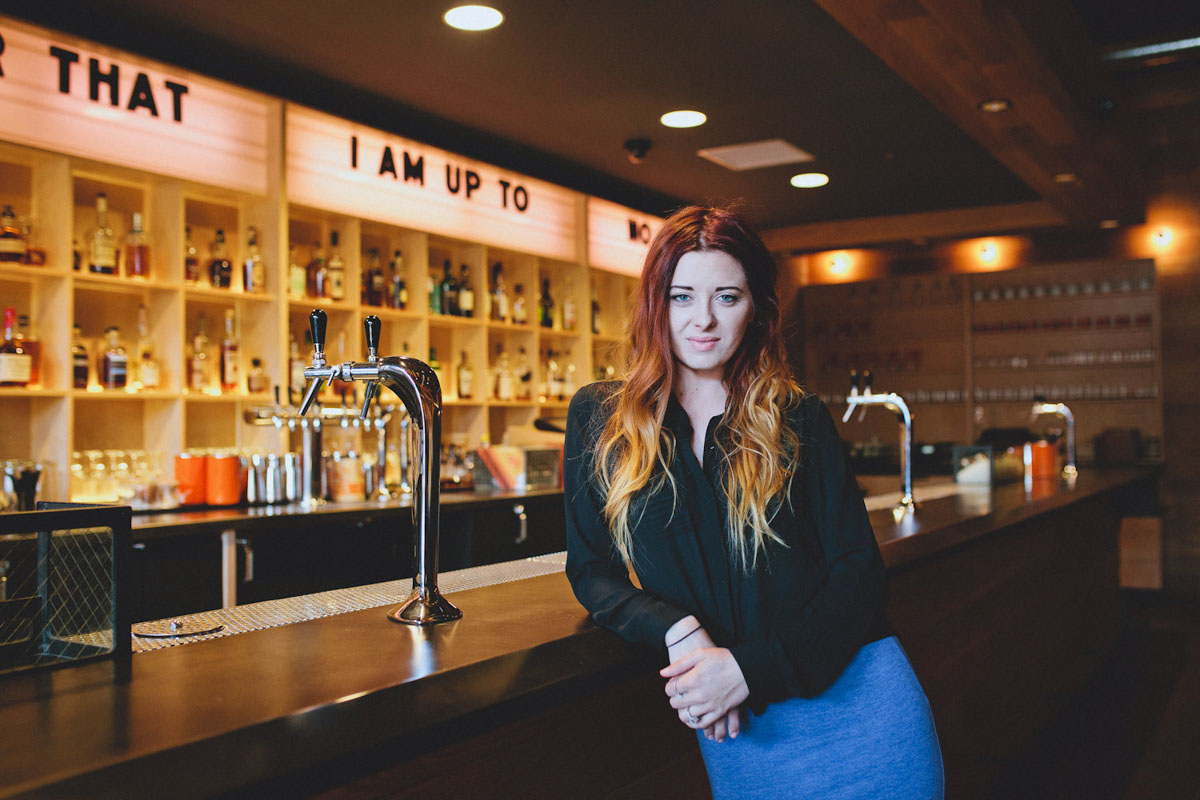
This past Saturday was Valentine’s Day, and coincidentally, the 4 year anniversary for The Salted Pig. It dawns on me then, that Wednesday morning, after having spent Valentine’s Day at W. Wolfskill with my own wife: the two restaurants are an homage to their marriage.
“Is The Salted Pig/W. Wolfskill a love letter of sorts?” I say. “There seems to be this theme for the restaurant, I guess a ‘labor of love.’ You told me your wife plays a big part in the business. Is this a love letter to her, or even her and your daughter?”
“Like anything we do in life as men, we do for women,” we both laugh. “To this day I’m still trying to impress my wife. Having her involved in the place, and seeing how hard I work, whether it’s for her or our daughter… I can’t imagine being at a point where we’re out without her. And we met in the hospitality industry.”
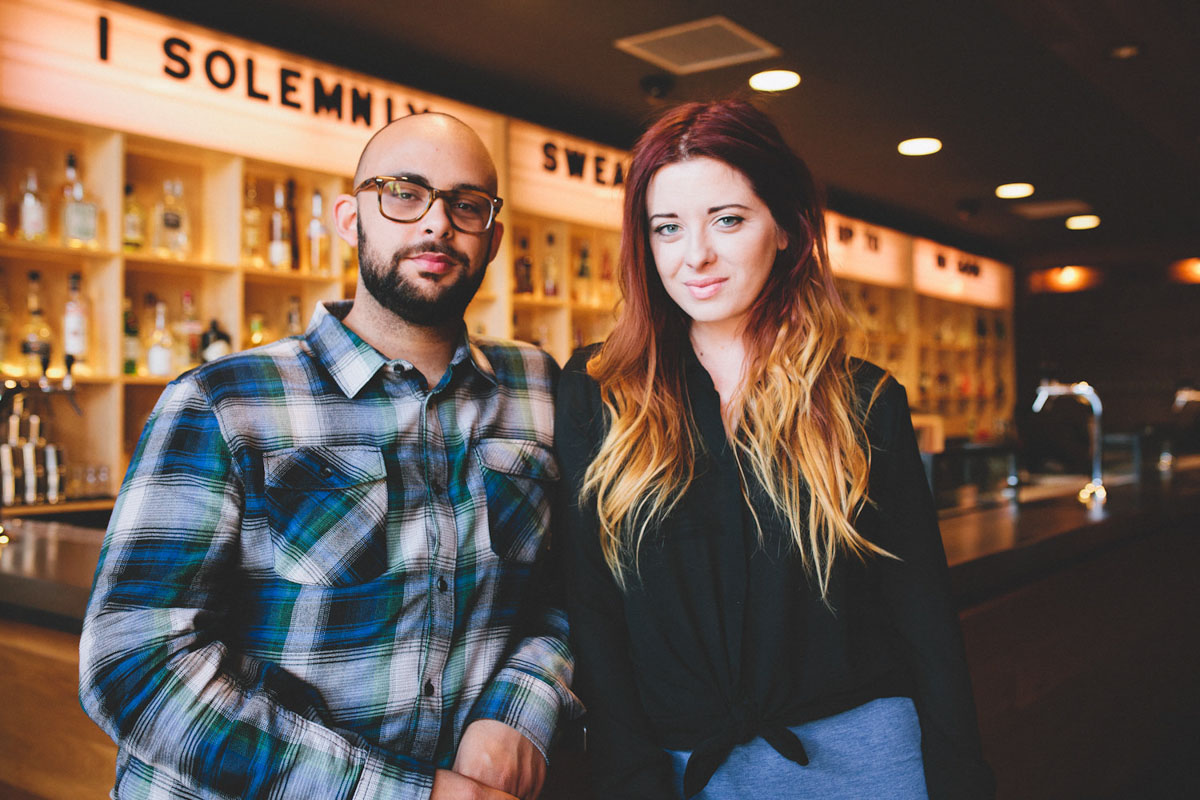
“This was at a Starbucks?”
“Right,” he says.
“Was this the driving force to open a restaurant? I know you had an interest while you were living in San Francisco for a time, and then moved back. Did that idea trickle down when you moved back here?”
“The interest to open a restaurant is rooted down deeper than just restaurant experience, for me and anyone I work and in the higher levels of our company. There is a sense of overwhelming need to be part of the hospitality business, which is to serve other people. To give other people things that you have made. This industry in no way has a shortage of people with huge egos, but for me and everyone I’ve ever worked work with, it has nothing to do with ‘you’. It’s this inherent need to please people, to want them to have a great time. I want my wife to be impressed, I want her friends to be impressed, when my daughter’s of age, I want her to bring her friends in here and be impressed. And I want a stranger, the guy I’ve never met before to walk in and have his mind blown. Not so he compliments me, or even thanks me, but so he leaves with a special memory,” he says, his eyes beaming.
“I had this thought,” I say, “about legacy. While part of this business might be a love letter to your wife, is there a sense of creating legacy for your daughter?”
“I started thinking about that recently. I feel like it’s a conceited way of thinking, like ‘I’ve created this thing that is bigger than myself.’ But I’ve always been self deprecating, I wasn’t popular in high school, so I’ve never really had that aspect to me. It’s hard to think like that, but recently, I don’t know who it was, maybe it was Lonny, but he said ‘well that’s going to be part of our legacy.’ And it got me thinking about it for a few days, and now I think ‘yeah, you do want to leave something behind.’ It’s not necessarily for my daughter, but it’s this thought when she’s sixteen years old and people ask her what her dad does, I want them to be like ‘oh shit, that’s awesome!’ If she can have that it would be amazing. But I also do what I do for Riverside. I was born and raised here and there are so many aspects of this city that I have fond memories of. And I hope that in ten, fifteen years people have fond memories of what we did. That’s something really cool, and I’ve been more comfortable with accepting it. Maybe we have finally built something that can last the test of time. Recently, I did a panel for the Chamber of Commerce with two guys here in Riverside that have owned restaurants for thirty years. And it was crazy to think that I’m sitting up here and there’s this small chance that I have a restaurant that’s more popular than both of those businesses. It’s crazy to think that I’m up there with these two men who I’ve respected for so long—maybe I can say we’re next in line for that kind of legacy.”
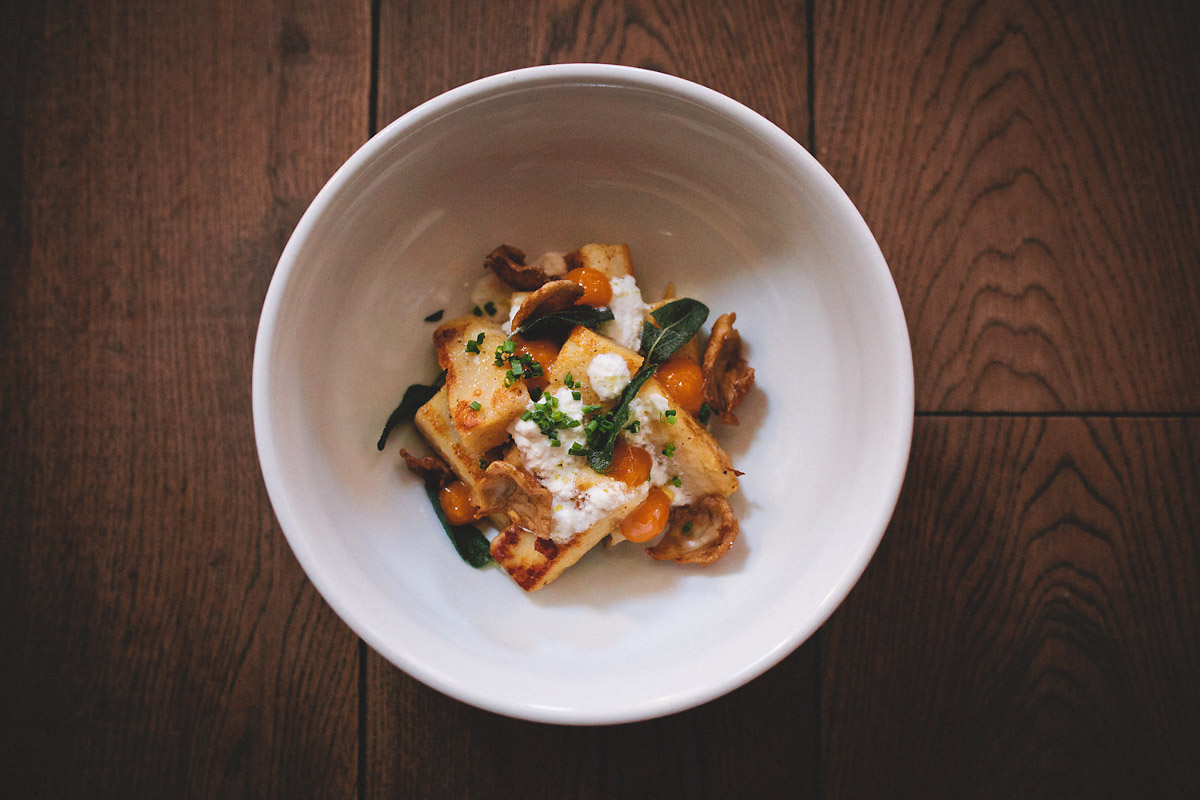
“Is there this sense that you’ve made it? Or is it just another plateau before you peak again?”
“That’s how I’ve always been. To me, I’ve always set a goal and then met it. Like when The Salted Pig first started out, I wanted to be the top rated restaurant on Yelp for Riverside and we did that. It’s a benchmark. I’ve hit that so I move to something else. Me or my dad have never been the kind of people to be satisfied with anything. My wife’s the same way. We’re both very restless. I always have ideas and I tell people. If I get a cockeyed look, I explain it more. If their eyes glaze over, it might be a bad idea. But if it sits with me a week later, maybe it’s real.”
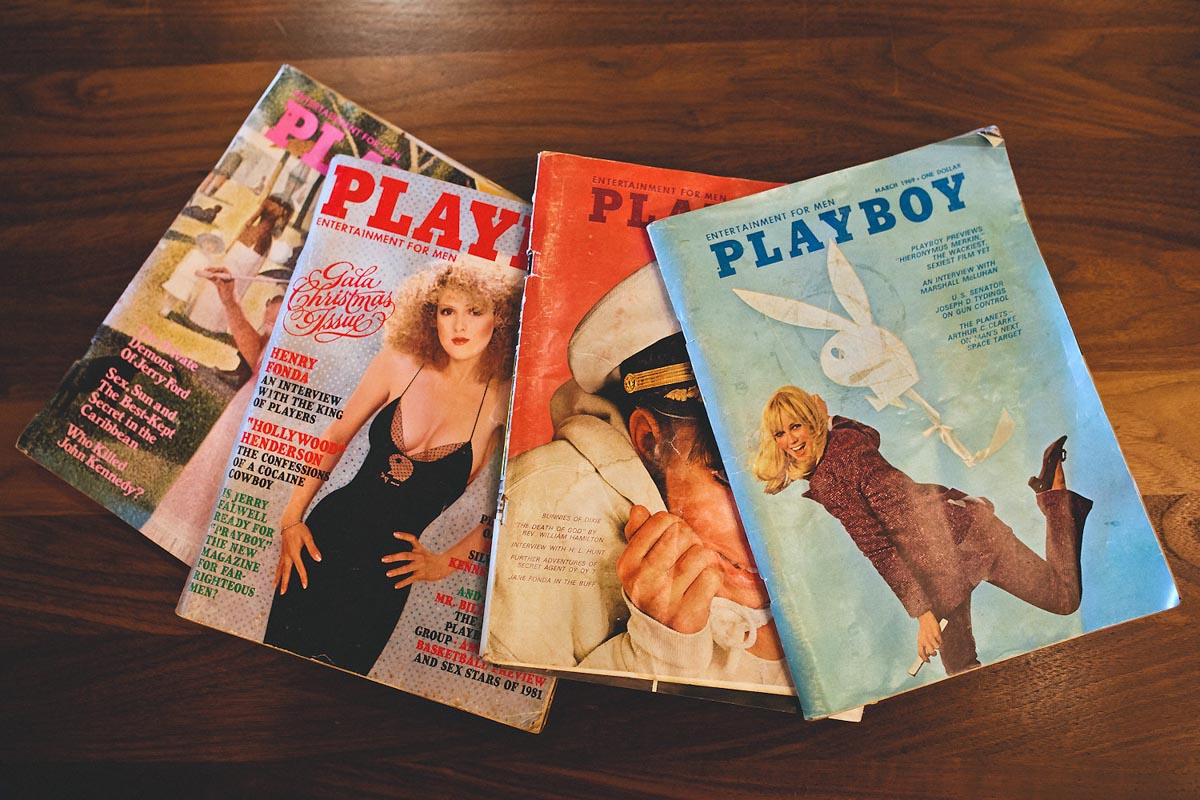
“Do you think you take after your dad?”
“In this industry, like the wholesale industry, when you get to deal with retail customers it’s a whole different game. But certainly, my dad has always been my hero and my mentor. Not just for being my dad, but for how he operated during the golden age of businesses when you had to be cutthroat to make it. He grew up very poor. The thing that he taught me, which has driven my business sense, so to speak, is that the salesman is the one who always wins. So many people can do good things, but if you can’t sell it—if your product isn’t perceived as good—it doesn’t matter how good it is. In that sense, things can come off as a little vain. I mean, I bought this three hundred dollar chair, is it a waste of money? Should I have bought the one hundred dollar chair? To me, anything great is a collection of little parts that are great. Nothing is ‘just grand.’ It’s grand because all the little parts are amazing. So whenever I do anything in the restaurant industry, that’s my goal: to make sure every little aspect on it’s own is worth while. And in the end, when people see all those great, little things, they are prepared to eat or drink something great. When they do, they’re satisfied.”
“What if they aren’t,” I ask.
“That’s why the name ‘The Salted Pig’ has become slightly problematic. No one likes to be tricked, or confused. The restaurant can be the best thing ever, but if they’re confused, the experience won’t register they way I hoped it would. I’m kind of a control freak,” he says and laughs. “I like the idea of being able to control every aspect of the dining experience from beginning to end.”

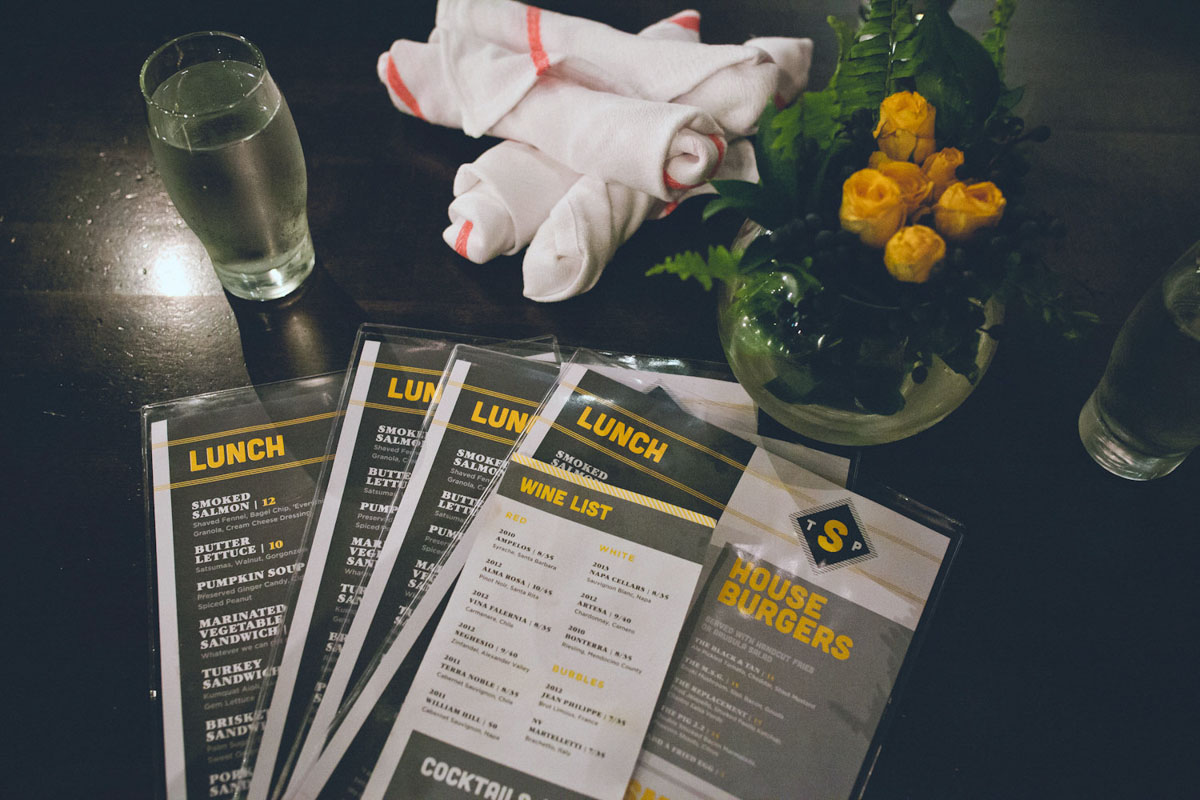
“Does that translate over to team building? At some point, do you have to delegate? You have Lonny, Larry, Bryan, your wife—are these the ‘small parts’ that make up the whole?”
“That’s always the hard part of building a business. I had to come to the realization that a working business is a group of people. And people are always going to be different, whether it be their personalities, their home life, why they get sad, why they get happy. The bigger we get, the harder it gets to manage all of these people. Not in the sense that they need to be ‘managed’—they are in their jobs because they’re good at them, they can self-delegate and problem solve. But trying to find the balance between everybody… that’s part of the vision a business. And the vision is only ever the starting point of a business, I like to think that everything else happens organically. For instance, I pick Larry as a chef so I’ve given him enough leeway that the food is a representation of who he is, not a representation of who I am. Same thing with cocktails, same thing with service, same thing with management. It’s more about us being all on the same page, at least most of the time,” he says.
“What happens when you have these ideas, this vision, I guess, and it doesn’t work?” I say.
Ronaldo smiles, and shakes his head.
“There are always your expectations and then there’s what actually happens. The dream of what I thought being a restaurateur was like was so far off from what it actually is. But I like that. As a kid I had this idea of what owning a restaurant was going to be, but really it’s mainly back-end work. It’s talking to people. In our industry that’s what we’re doing, repeatedly doing the same thing over and over again so that we can deliver the same great experience to different people, five hundred times a night, three hundred and sixty five days a year. It’s not as romantic as you might think,” he says and laughs. “Not at all.”
“Does that become overwhelming?”
“No,” he says.
“I can imagine that would blow my mind, pleasing every person. How do you balance that?”
“It comes from not taking anything personal. I’ve learned that. Whether it be Yelp or comments on some website, a comment the hostess overheard on the way out. I struggled at first. But it’s just like a batter; if someone is batting point three hundred a game, they shouldn’t feel that bad about striking out once or twice. I mean, if we’re doing our jobs correctly and we serve five hundred people on average a night, one complaint is still a pretty good batting average. So I shouldn’t beat myself up. I can’t speak for anyone in the industry, but I know I am, and I guess Larry’s the same way: I’m masochist,” he says and grins. “If I go through Yelp one day, I’m reading one star reviews. I need to read the bad things, the angry comments, the complaints.”
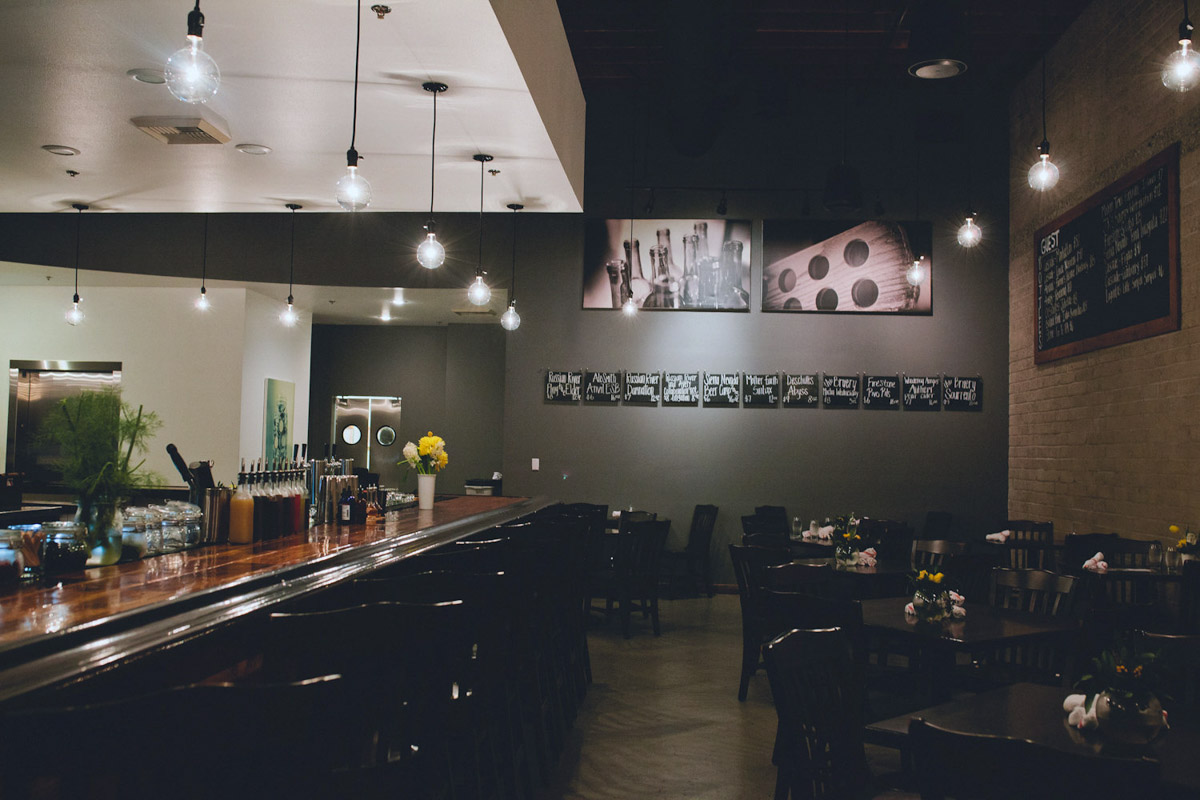
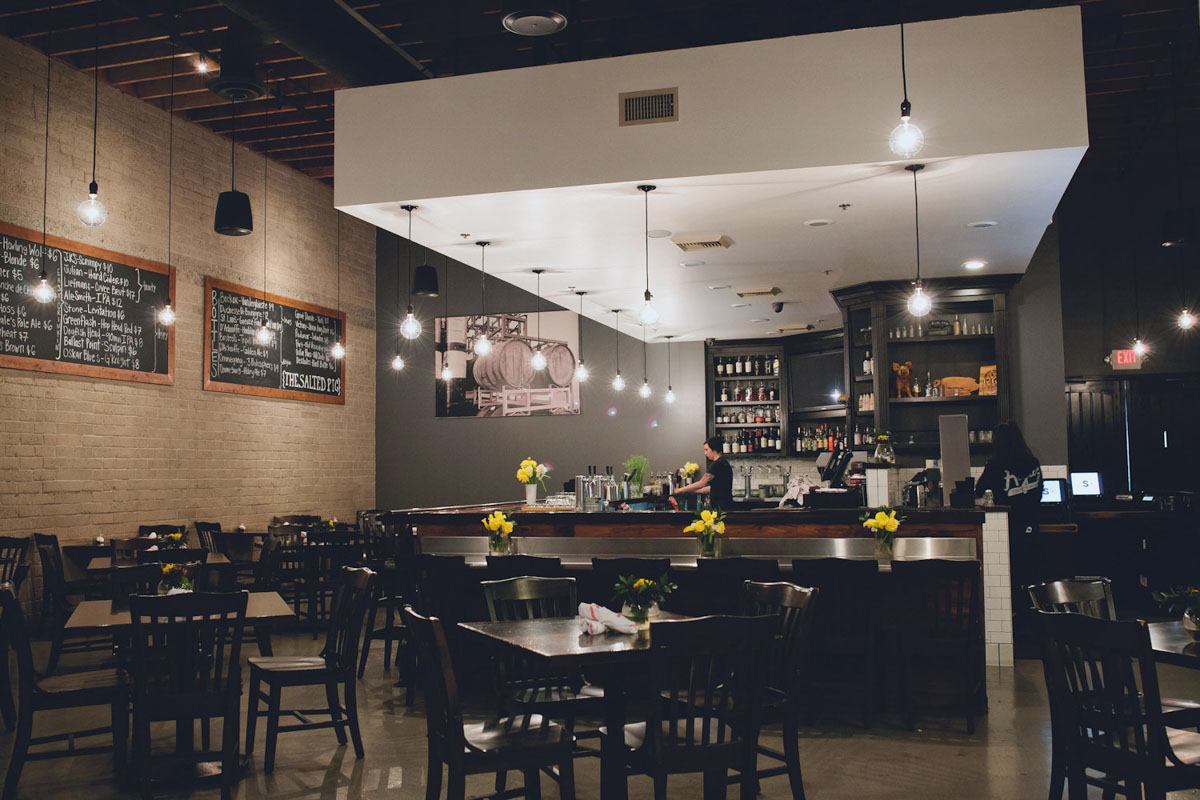
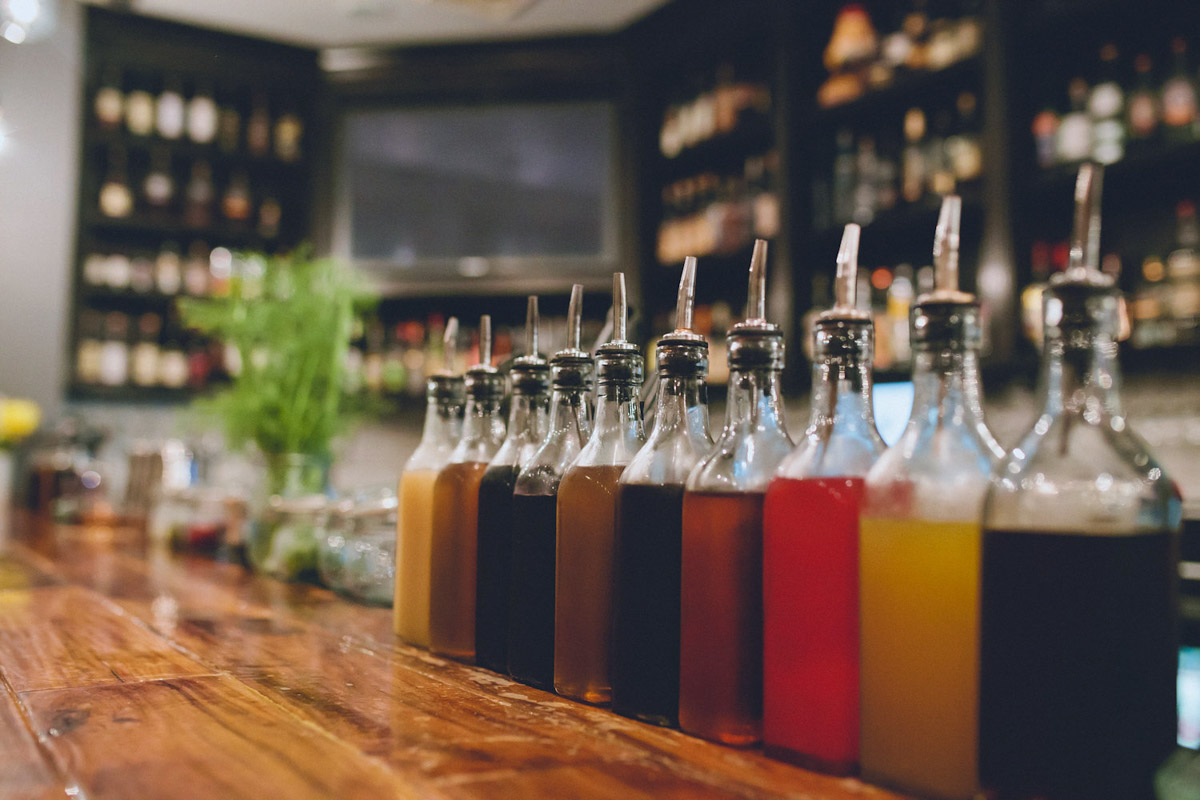
“Does that lead to self improvement? Radical revision maybe?”
“Exactly. It’s keeping yourself in check. There’s no way you’re perfect, especially in this industry. You can say perfection is somewhat attainable, depending what you do. But you don’t deal with absolutes in this industry.”
“So you have your concept of the dining experience, does the outside environment shape that? You had said that you don’t want to ‘change’ Riverside, but instead have it change with you. How would you do that?”
“You can’t please everyone. If you try, you’ll end up with nothing. You have to go with your vision, cross your fingers, and hope people agree with you. It’s getting people to trust you. That’s what we’ve had to do in Riverside. Maybe this meal isn’t what someone would normally try, but if they have in your restaurant, they say ‘go ahead and make me this meal, make me this drink’.The problem with restaurants is that there are good ones, there are bad ones, and people need to trust what you do. That’s what we are, we are their food experts, their cocktail experts. And I’m not saying I’m smarter than anyone, but this is what I do for a living. We’re not expecting people to be food experts.
“For me, with the city of Riverside, it was about building trust. It was, let’s all stay on the same page for a little bit. And then we could say, I honestly think this dish will work, I know you haven’t tried it before and I know it hasn’t been offered in the area, but give me a shot. Try it out. That has worked and people were coming again and again and, before we knew it, we were shaping people’s palates and assumptions of what a restaurant can be. We were just lucky enough to do it right away. If we do our job right, we won’t be the only ones. I don’t want to be the only restaurant in town that does that, I want competition. Living in a place where I have nowhere else to go out to eat or drink is boring. In the end, this is my hometown and I want it to be good. That’s always what has driven me. I create fake competition. I mean, I look at something and think, ‘what is this, what’s this place opening, what are they serving.’ That drives me, that’s how my mind works you know? I’m masochistic and think everyone’s out to get me and trying to steal. But we’ve been lucky enough to have the city embrace what we did.
“People take eating out seriously. Who doesn’t want to go to a restaurant and sit at the table and have someone serve them. What if no one has ever served them? Their wife or husband is mean to them. They’re shit on at their job. They come to this one place where they’re paying more for their food than what they pay at a grocery store, but with that comes this incredible service. I think that that is such an important part of who people are fundamentally.”
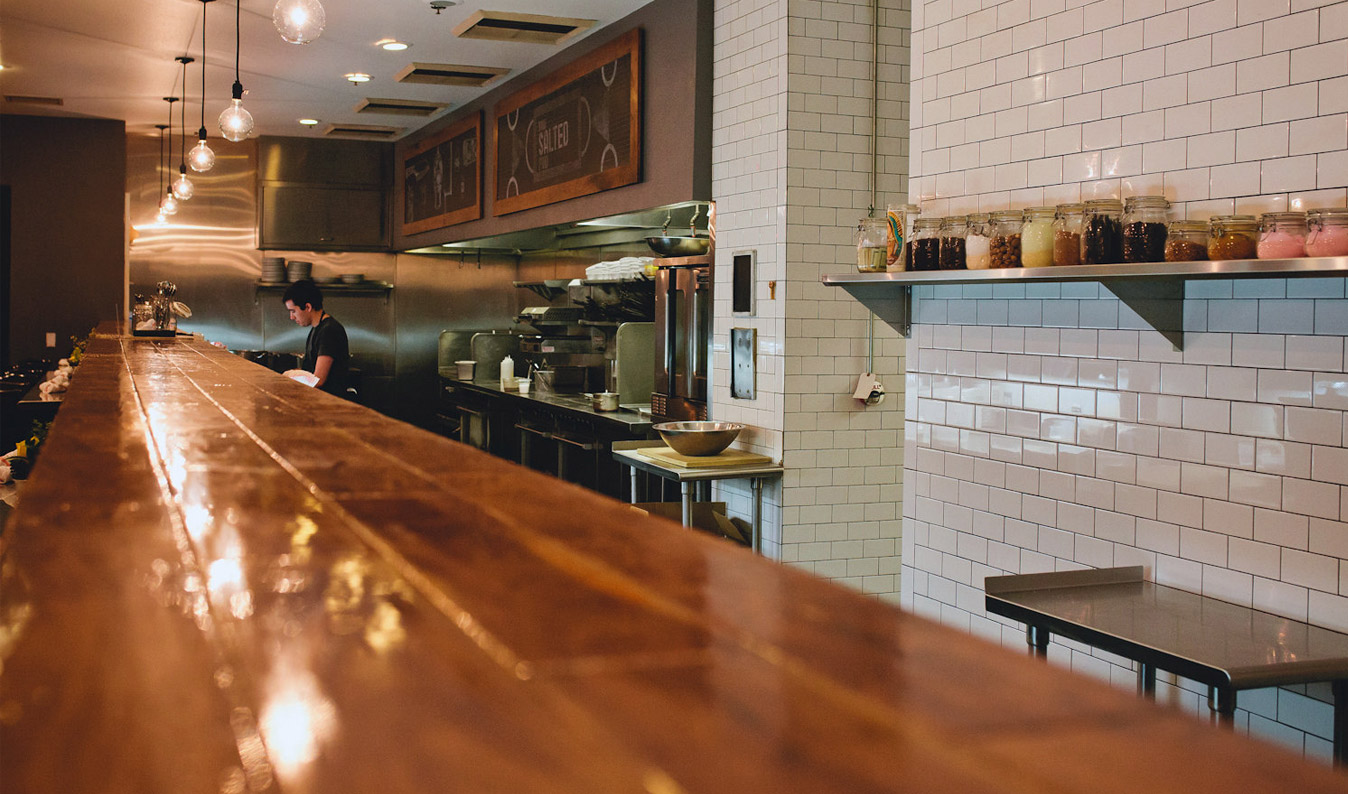
“Did you ever have the experience yourself?” I ask.
“Yeah. I’m sure my dad put the idea in my head when I was younger, because I mean, who doesn’t want their kid to have cool job? Growing up, we had a family friend who owned a restaurant in Indian Wells called Vicki’s of Santa Fe. It had a very simple menu, a few steaks, a few entrees—I’ve always loved steaks. But something about the place always appealed to me. The place was always packed, people were bustling in and out. The place was very loud and happy, but there was this level of calm with the service staff, with the owner, with all the small parts moving together. It was kind of like a ‘Beautiful Mind’ moment, I could see everything happening at once. I was about sixteen, I think. I could see all of these moving parts, how the server needed the busser and the hostess worked with the bartender—it got me excited. I could finally see it all. It was really invigorating, you know? From that point on, it was all I could think of. But of course, there are bumps in the road. You change your mind. I wanted to be a journalist for a while, so I pursued that.”
“Were you going to be a food journalist?”
“Maybe I would have pursued that eventually. I had this idea of writing groundbreaking, cutting edge political stories, but I’m sure that if you’re smart about it, you eventually find a way to combine all your passions. Like, one of my assistant managers is super smart and she wanted to be scientist. But now she wants to be a food scientists because she fell in love with the restaurant. So that’s what she did, she combined all things she was passionate about.”
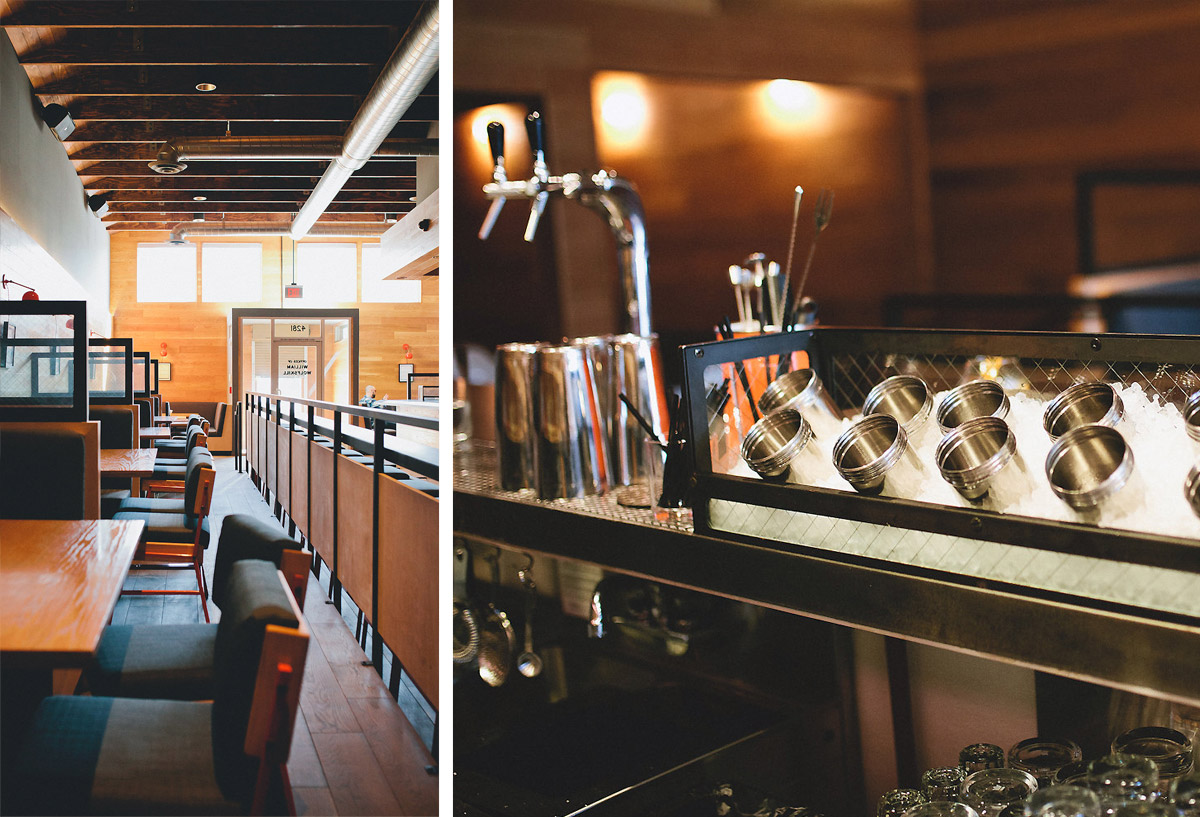
“So what’s next then? You seem like you’re never going to settle, which is probably something of a recipe for success. Do you have another plan or vision?”
“At any given time it’s more just free-form. We look at opportunities as they come. Hospitality only makes sense in the context of community. For better or for worse, I think our two restaurants are successful because this is my hometown. I know it. I know the people, I know the streets. I know every corner and bush. I know downtown like the back of my hand. And in some way or another, I think when you know everything about a place, part of your brain figures it out. You see the problems happening, and you will see what can make it good. So leaving to go to another community is—well, as exciting as it is—also scary. Orange County and L.A., for example, are two huge markets, but they’re also huge risks.”
“Do you base your concept on things you like to eat personally?”
“I like to think W. Wolfskill and The Salted Pig were just reactions to me not having anywhere to go eat and drink. The gastro movement was rooted in this, ‘I want to go have a nice meal but I don’t want to pay thirty dollars for it.’ So give me a thirteen dollar burger. Then we started to do the cocktail program at The Salted Pig and that wasn’t enough. We bought this building right here, so I knew we had to do a cocktail bar. I researched everything there was to know in the cocktail world and we moved forward. The reason we brought Proprietors [LLC.] in was that I am in no way an expert, and no one I knew was a cocktail expert, so our only option was to seek outside guidance. It’s the perfectionist mentality that says, I can’t do something that’s good for just Riverside, nor can I do something that’s just good for Southern California, it has to be good on a worldwide level. Like where anyone can go there and it be a good experience, regardless of their previous experience. While it’s community-based, that doesn’t mean our standards for what’s good and bad is completely relevant to the community because they’re entitled to something great. They’re entitled to great food, to great cocktails, and if there are no great hospitality businesses in their city, then all they’re allowed is one step beyond that? No, that’s bullshit.”
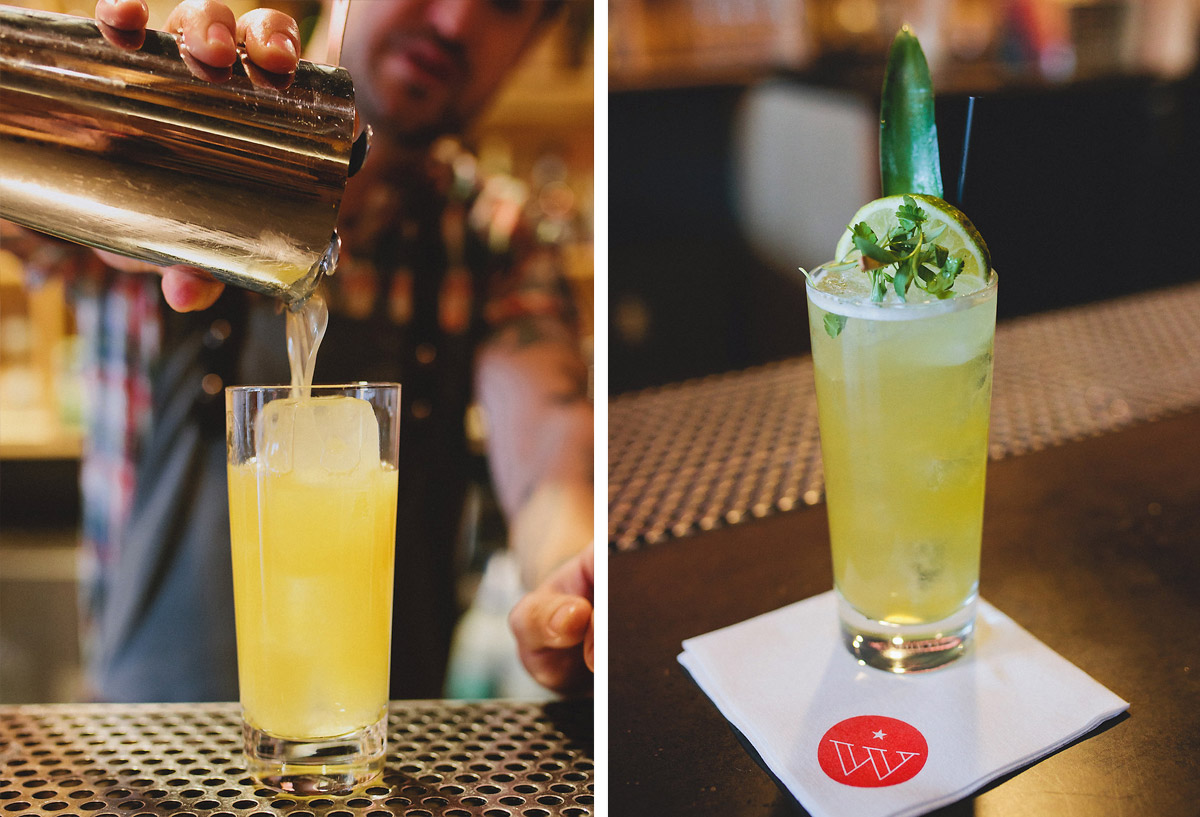
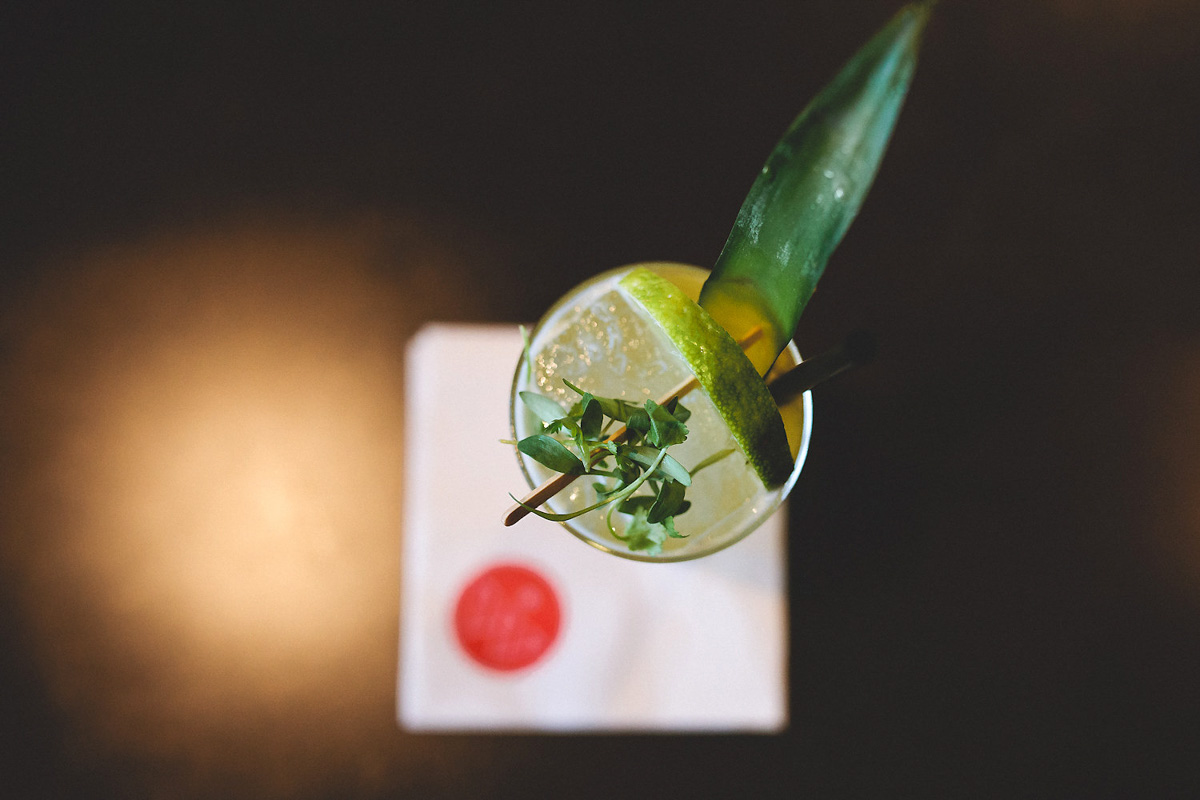
4.
As we wrap up the interview, Ronaldo’s wife Sheena arrives. She apologizes for being late, explaining that their daughter wasn’t feeling well. Sheena sits next to Ronaldo at the table and they discuss their plans for the rest of the day. Now, I see the working collection of small, integral parts that Ronaldo mentioned during our interview. This husband and wife are two important parts of the working whole. They regard their team as equals, having purpose and function in keeping the business running. These individual pieces are the minutiae that makes up the whole of the bar.
Moving to a grander scale, patrons of W. Wolfskill and The Salted Pig play an important role in the business. Then there is the city of Riverside, the construction, the traffic, the law offices. All of these parts add to the livelihood of The Salted Pig and W. Wolfskill which, when put together, create something world class in an unexpected place.
Before we all leave, Ronaldo wants to show me something. We stand in the small walkway between the outer roll-down door and glass front door to W. Wolfskill. This space barely fits the two of us, but there is something serene about it. Sunlight from the outside is cast on our feet. Beyond the glass door is the long bar, each chair pushed in. “Look at this,” he says excitedly. He points at the simple, yet intricate gold-leaf sign lettering that says ‘OFFICES OF WILLIAM WOLFSKILL.’ He explains that they had one of the last original gold leaf sign letterers do this for the bar. “No one does this anymore,” he says. “It’s a lost art.”
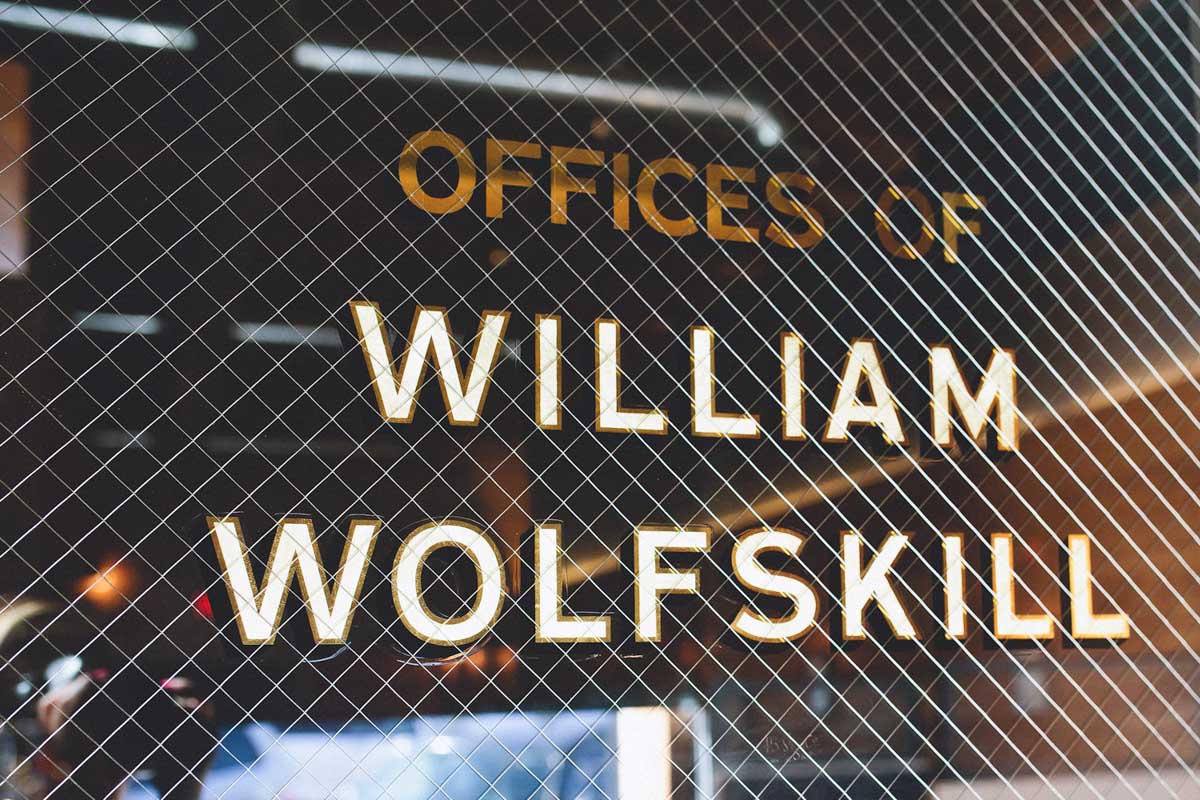
I admit that I hadn’t even noticed during each of my prior visits.
“People tend not to,” Ronaldo says. “But when they do—man, I love it. It’s one of my favorite things about the bar.”
—
The Salted Pig
3700 12th St, Riverside, CA 92501
W. Wolfskill
4281 Main St, Riverside, CA 92501





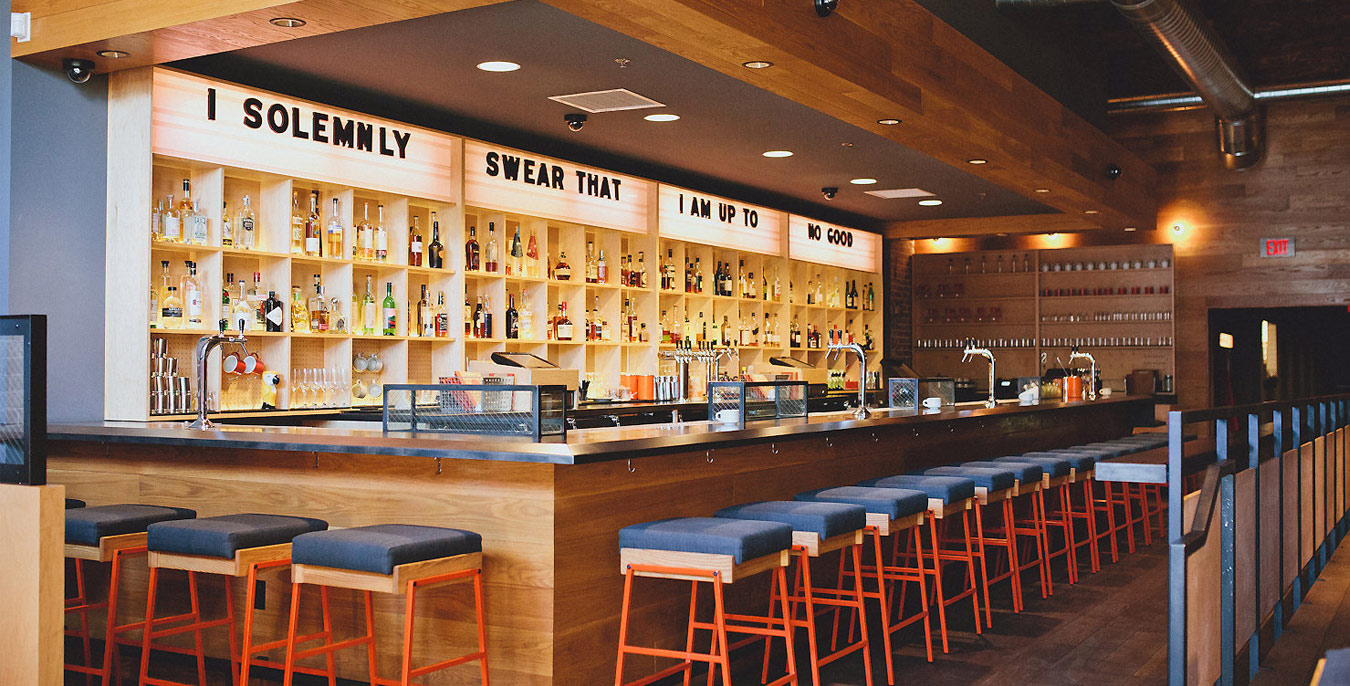

Our comments section is for members only.
Join today to gain exclusive access.